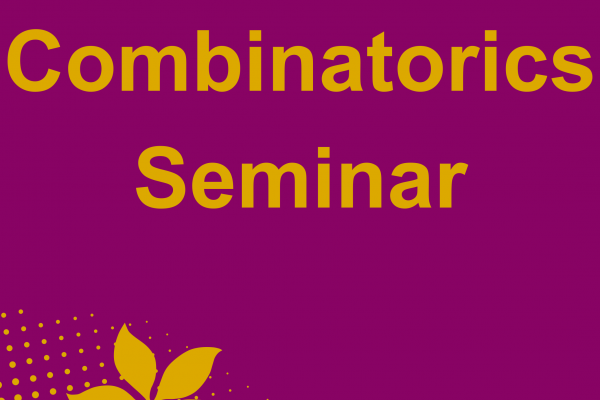
October 22, 2020
10:20AM - 11:15AM
Zoom
Add to Calendar
2020-10-22 10:20:00
2020-10-22 11:15:00
Combinatorics Seminar - Rob Morris
Title: Flat Littlewood Polynomials Exist
Speaker: Rob Morris - IMPA
Abstract: A polynomial $P(z) = \sum_{k=0}^n \eps_k z^k$ is a Littlewood polynomial if $\eps_k \in \{-1,1\}$ for all $k$. Littlewood proved many beautiful theorems about these polynomials over his long life, and in his 1968 monograph he stated several influential conjectures about them. One of the most famous of these was inspired by a question of Erd\H{o}s, who asked in 1957 whether there exist “flat” Littlewood polynomials of degree $n$, that is, such that
$$\delta\sqrt{n} \le |P(z)| \le \Delta\sqrt{n}$$
for all $z \in \mathbb{C}$ with $|z|=1$, for some absolute constants $\Delta > \delta > 0$. In this talk we will describe a proof that flat Littlewood polynomials of degree $n$ exist for all $n \ge 2$. The proof is entirely combinatorial, and uses probabilistic ideas from discrepancy theory.
Joint work with Paul Balister, Béla Bollobás, Julian Sahasrabudhe and Marius Tiba.
Zoom
OSU ASC Drupal 8
ascwebservices@osu.edu
America/New_York
public
Date Range
Add to Calendar
2020-10-22 10:20:00
2020-10-22 11:15:00
Combinatorics Seminar - Rob Morris
Title: Flat Littlewood Polynomials Exist
Speaker: Rob Morris - IMPA
Abstract: A polynomial $P(z) = \sum_{k=0}^n \eps_k z^k$ is a Littlewood polynomial if $\eps_k \in \{-1,1\}$ for all $k$. Littlewood proved many beautiful theorems about these polynomials over his long life, and in his 1968 monograph he stated several influential conjectures about them. One of the most famous of these was inspired by a question of Erd\H{o}s, who asked in 1957 whether there exist “flat” Littlewood polynomials of degree $n$, that is, such that
$$\delta\sqrt{n} \le |P(z)| \le \Delta\sqrt{n}$$
for all $z \in \mathbb{C}$ with $|z|=1$, for some absolute constants $\Delta > \delta > 0$. In this talk we will describe a proof that flat Littlewood polynomials of degree $n$ exist for all $n \ge 2$. The proof is entirely combinatorial, and uses probabilistic ideas from discrepancy theory.
Joint work with Paul Balister, Béla Bollobás, Julian Sahasrabudhe and Marius Tiba.
Zoom
Department of Mathematics
math@osu.edu
America/New_York
public
Title: Flat Littlewood Polynomials Exist
Speaker: Rob Morris - IMPA
Abstract: A polynomial $P(z) = \sum_{k=0}^n \eps_k z^k$ is a Littlewood polynomial if $\eps_k \in \{-1,1\}$ for all $k$. Littlewood proved many beautiful theorems about these polynomials over his long life, and in his 1968 monograph he stated several influential conjectures about them. One of the most famous of these was inspired by a question of Erd\H{o}s, who asked in 1957 whether there exist “flat” Littlewood polynomials of degree $n$, that is, such that
$$\delta\sqrt{n} \le |P(z)| \le \Delta\sqrt{n}$$
for all $z \in \mathbb{C}$ with $|z|=1$, for some absolute constants $\Delta > \delta > 0$. In this talk we will describe a proof that flat Littlewood polynomials of degree $n$ exist for all $n \ge 2$. The proof is entirely combinatorial, and uses probabilistic ideas from discrepancy theory.
Joint work with Paul Balister, Béla Bollobás, Julian Sahasrabudhe and Marius Tiba.
